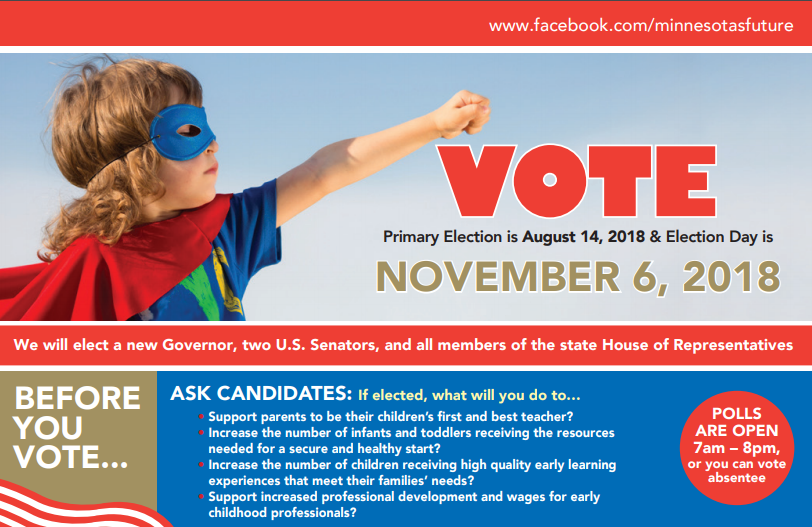“Knock knock. Who’s there? Candidates.Candidates who? Candidates for Governor, Senator, Attorney General, State House of Representatives….”
Campaign season is in full swing, and candidates around the state are knocking on doors in hopes of winning your vote. You can use this as an opportunity to learn about where candidates stand and connect with them on issues that are important to you.Whether you’re super busy or have just a little free time, there are steps you can take to prepare for interactions with candidates. You’ll likely run into them around town knocking at your door or appearing at a local community event. Here’s a guide for making the most of your time with a candidate.
If You Have 2 Minutes to Prepare
Glance over this handy voter card. Choose one or two questions you’d like to ask, and a fact or two you’d like to share with them. You can keep it by the door so you’re ready to seize any opportunity.
If You Have 10 Minutes to Prepare
Brainstorm what you’d like to share and ask.
- What issues are most important to you?
- What would you like to know about where candidates stand on those issues?
Be as specific or general as you have time for. You might have different questions for statewide officials versus local ones, or you can keep them general enough to apply to nearly anyone.Write your questions down on a piece of paper or a sticky note. Put it by the door so you’re ready.This is even more effective if you can add a little personal connection. For example:I work with families who are experiencing homelessness and I see the urgent need for more opportunities for them. What will you do to provide affordable housing options in our community?My family visits our local park all the time, and we really value that resource. What will you do to maintain and expand green space?I’m concerned about the cost of healthcare for my aging relatives. What is your plan to address the cost and availability of healthcare?
If You Have 30 Minutes to Prepare
Personal stories are powerful. Take some time to work on your personal story to share with candidates.
- What issues are important to you and why?
- What personal experiences do you have with those issues that make them important?
- How do these issues impact your loved ones?
- Are there services that are important to you? What would happen if those services went away?
 Work on crafting versions of your story that you can share in 30 seconds, 2 minutes, and 5 minutes. It really helps to practice out loud. Candidates don’t often have a lot of time, so sharing your story concisely makes it effective and memorable. It sets up context for your question(s), which you can ask after sharing your story.For Example:I’ve worked with young children and their families for over 10 years. I started this work because I love children and really enjoy seeing them learn and grow in supported environments. My co-workers and I are all highly-skilled, qualified educators who care passionately about the work we do. It’s also important work, as children develop rapidly in the first few years of life. Neuroscience research tells us it is crucial for children’s brain development to be in high-quality environments like where I work. Unfortunately, we struggle to keep quality staff because of the low wages in the field. There also aren’t enough new people interested in entering into early childhood education. What ideas do you have to address these issues?Think of these interactions as starting to build a relationship. If the candidate who showed up at your door ends up winning, you already have an interaction under your belt. You can build on that for future advocacy.Not sure exactly what responsibilities each office covers? Check out this handy resource for state offices and this broad overview of county and local government. Or, just ask!
Work on crafting versions of your story that you can share in 30 seconds, 2 minutes, and 5 minutes. It really helps to practice out loud. Candidates don’t often have a lot of time, so sharing your story concisely makes it effective and memorable. It sets up context for your question(s), which you can ask after sharing your story.For Example:I’ve worked with young children and their families for over 10 years. I started this work because I love children and really enjoy seeing them learn and grow in supported environments. My co-workers and I are all highly-skilled, qualified educators who care passionately about the work we do. It’s also important work, as children develop rapidly in the first few years of life. Neuroscience research tells us it is crucial for children’s brain development to be in high-quality environments like where I work. Unfortunately, we struggle to keep quality staff because of the low wages in the field. There also aren’t enough new people interested in entering into early childhood education. What ideas do you have to address these issues?Think of these interactions as starting to build a relationship. If the candidate who showed up at your door ends up winning, you already have an interaction under your belt. You can build on that for future advocacy.Not sure exactly what responsibilities each office covers? Check out this handy resource for state offices and this broad overview of county and local government. Or, just ask!
- For what duties would you be responsible if elected?
- How does the work you would do affect children and families in this community?
Use these strategies at home, but don’t be afraid to take the show on the road. Share your story and questions at candidate forums, town hall meetings, parades, and fundraisers. Share what you learn with friends and family members in the district to help them make informed decisions.Door-knocking is often thought of as a one-way conversation, but with a little preparation you can take advantage of having the candidate coming right to you and have a dialogue.By Marie Huey, Public Policy and Advocacy Coordinator








